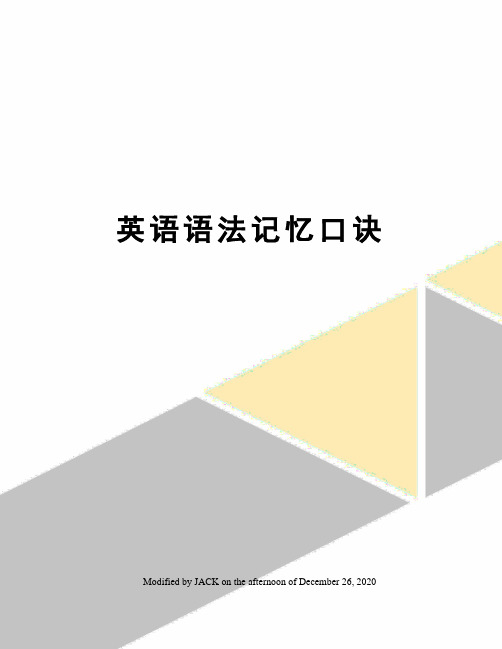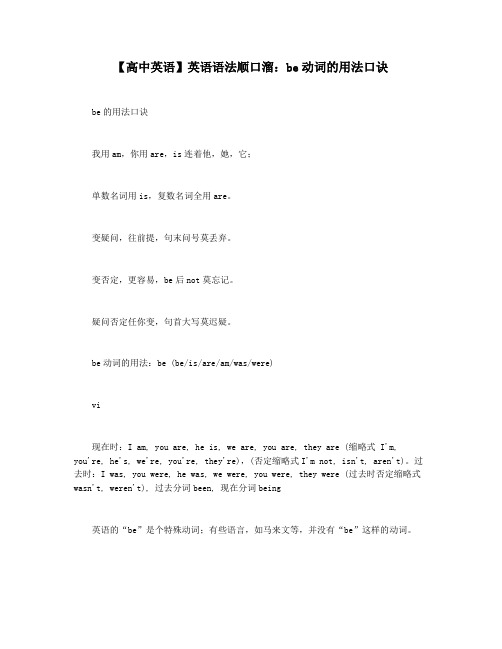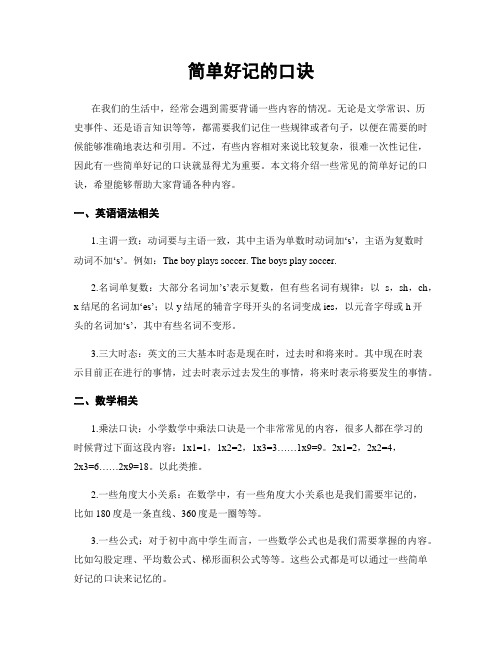高中语法动词记忆口诀
一类动词口诀

一类动词口诀
学习动词的分类时,有一些常见的口诀可以帮助记忆。
以下是一个用于记忆动词分类的简单口诀:
"动词分三类,谓语助谓静。
动作抽象情,及物不及物。
分清主动责,及物需加宾。
不及物无宾,独立呼号鸣。
及物两宾前,须看搭配真。
主宾关系近,先宾后宾清。
不及物后宾,主宾紧相随。
主动无人作,中间跳过宾。
再看及物形,补语常缺席。
要么过去来,要么时空翻。
单宾注意数,双宾用顺序。
口诀牢记心,动词不再烦。
"
这个口诀以一些基本的动词分类和搭配规律为基础,希望对你记忆动词分类有所帮助。
记住,口诀只是一种辅助记忆的方式,结合实际例子和实际运用可以更好地理解和掌握动词的用法。
英语语法记忆口诀

英语语法记忆口诀 Modified by JACK on the afternoon of December 26, 2020英语语法记忆口诀1、一般现在时一般现在时态中,动词一般用原形。
表述事实讲真理,习惯动作常发生。
动词词尾加-s(es),只表单数三人称。
若变一般疑问句,得看句型是哪种。
系表结构和there be, be放句首可完成;若遇实义动词句,do或does莫忘用!2、现在进行时Look, Listen是标志,现在进行正发生;有时now在句中现,“be+v-ing”时态成。
若问be用何形式,须看主语数、人称。
He / She is, I am. We, you, they后are紧跟。
v-ing形式更好记,三种构成要分清。
一般问句be提前,be后加not否定成!3、基数词变序数词基变序,很容易,一二三,特殊记,th从四起。
八去t来九去e,遇到ve,f 替,ty变为tie,后加th莫迟疑,若想表示几十几,只变个位就可以。
时间介词巧记歌年、月、季节前须用in,(如:in 2008, in September, in spring)日期前面行不通。
遇到几号改用on,(如:on January 1)上午、下午、晚上仍用in。
(如:in the morning/afternoon/evening) 若是某日上下午,也是用on才能行。
(如:on the evening of the Mid-autumn Day)正午、夜里用at,(如:at noon, at night)时、分用法也同理。
(如:, at two, at two)如若“差”点须加to,(如:two to two)如若“过”点改past。
(如:half past one)多说勤练牢牢记,学好英语非儿戏。
4、谓语be的用法我用am,你用are除此之外的单数包括他她还有它统统都是用is我们你们和他们只要复数都用are5、一般疑问句和否定句的变化一般问句并不难,谓语调到主语前。
二十一个巧记英语语法的口诀

二十一个巧记英语语法的口诀1、英语的词类句子要由词组成,英语词类有十种:句中成分用实词,名、代、动、副、数、形容:冠、介、连词和感叹,虚词附加或沟通。
词类功能掌握了,造句之时好运用。
2、语序歌主、谓、宾、表同汉语,定语有同也有异。
状语位置更特殊,不能全和汉语比。
3、肯定句变一般疑问句have和be提句首,其它助词Do开头。
时间、人称由do变,动词只把原形留。
谓语助词有几个,第一助词提句首。
4、肯定句变否定句否定词语加not,放在be和have后。
其它要加动词do,do的后面加not,时间、人称由do变,动词原形总保留。
谓语若是助词多,not紧跟第一个。
5、名词的所有格名词只变数,不分主宾格。
人和动物类,可变所有格。
撇(’)后加s,相当汉语“的”。
时间、距离等,也变所有格。
6、名词变复数单数变为复数式,加上“s”统言之。
下列结尾名词后,要加“s”先加“e”:发音[∫][t∫][s]和[z],或是辅音加“o”时。
有些名词变复数,词尾变化要注意:“y”前字母是辅音,一律变“y”为“ie”;遇到“f / fe”,有时需要变“ve”少数名词不规则,特别情况靠硬记。
7、时间名词前所有介词的速记年月周前要用in,日子前面却不行。
遇到几号要用“on”,上午下午又是“in”。
要说某日上下午,用on 换in 才能行。
午夜黄昏用at,黎明用它也不错。
at 也在时分前,说“差”用to,说“过”要用past。
8、介词用法歌介词加宾语,才能有实意。
表、定、状、宾、补,词组在句里。
9、介词顺口溜in 在……里,out 在……外,在旁边的是beside,靠近的为by。
on 在……上,under 在……下,above 在上头,below 在底下。
10、be的用法歌动词be,变化大,“I”用“am”“You”用“are”Is用于它(it)、他(he)、她(she)复数一定要用“are”,切莫用错闹笑话。
11、动词的时态四种时间各四式,联想对比便于记。
【高中英语】英语语法顺口溜:动词的不定式的用法记忆口诀

【高中英语】英语语法顺口溜:动词的不定式的用法记忆口诀动词的不定式:
①不定式有标记,to与动词连一起。
②没有人称数变化,动词特点它具备。
③主宾定状表补语,唯独作谓不可以。
④not 加上不定式,否定结构要牢记。
⑤疑问词与不定式,构成短语有意义。
⑥仔细推敲多思考,准确判断有依据。
解析:
①“to+动词原形”是它的基本构成形式,即不定式的标记。
②它没有人称和数的变化,不管主语是任何人称,单数还是复数,动词不定式都没有变化。
但它仍保留动词的特点,可以有自己的宾语或状语。
③它具有名词、形容词和副词三大特点,所以,它在句中可以作主语、宾语、定语、表语、状语和宾补。
④“not +动词不定式”是它的否定形式,不要受其他否定式的影响,要记住规律。
⑤疑问代词what,who,whom,which和疑问副词where,when,why,how加上不定式在句中可以做主语,宾语、表语、状语。
⑥通过以上分析,只要仔细研究,把不定式的功能用法搞清楚,在应用时就能作出准确的判断。
感谢您的阅读,祝您生活愉快。
【高中英语】英语语法顺口溜:be动词的用法口诀

【高中英语】英语语法顺口溜:be动词的用法口诀be的用法口诀我用am,你用are,is连着他,她,它;单数名词用is,复数名词全用are。
变疑问,往前提,句末问号莫丢弃。
变否定,更容易,be后not莫忘记。
疑问否定任你变,句首大写莫迟疑。
be动词的用法:be (be/is/are/am/was/were)vi现在时:I am, you are, he is, we are, you are, they are (缩略式 I'm,you're, he's, we're, you're, they're),(否定缩略式I'm not, isn't, aren't)。
过去时:I was, you were, he was, we were, you were, they were (过去时否定缩略式wasn't, weren't), 过去分词been, 现在分词being英语的“be”是个特殊动词;有些语言,如马来文等,并没有“be”这样的动词。
“Be”除了原形的“be”之外,还有另外七种形式:am, is, are, been, being, was, were。
在句子中,“be”可以是主动词(The Principal Verb)或助动词(The Auxiliary Verb)。
例句对照【当主动词时,“be”在性质上属于接系动词(The Linking Verb),后面要有名词、形容词、地方副词或短语作补足语(The Complement)。
例如:1. The man is a science teacher.这个男子是一位科学教师2. Mary's new dresses are colourful.玛丽的新衣服色彩鲜艳3. I have been there before.我以前去过那里4. My mother is watching TV in the room.母亲现在在客厅看电视这四个都是陈述句,可以变成疑问句,方法简单,把主语和“be”或助动词对换位置即可:5. Is the man a science teacher?6. Are Mary's new dresses colourful?7. Have I been there before?8. Is mother in the kitchen now?当“be”要在祈使句中出现时,它必须借重助动词“do”或“don't”之助,如:9. Don't be silly!10. Do be obedient!11. Don't be a fool!“Be”有两种缩写法,如下:12. He's not...../He isn't....13. You're not...../You aren't...但“am + not”的缩写法只有一个:14. I'm not.有人用“ain't”, 但这并不是标准英语。
高中英语语法记忆顺口溜

(B)形、代定语主宾前:指形容词、代词作定语常位于一个句子的主语或宾语的前面。
如上句中our这个形容词性物主代词就放在politics teacher前面作定语。
(C)间宾直宾紧相依:指某些动词后面常接两个宾语(即直接宾语和间接宾语)。
在通常情况下,表示人的名词或代词作间宾,表示物的名词或代词作直宾。
而且在结构上间宾后面紧接着是直宾,中间不用任何词。
如果强调直接宾语,则可以把直宾调到间宾之前。
这时,直宾后面要加上介词to或for再接间宾,这就叫“直、间之间to、for连”。
如:He gave some money to me.主谓定直宾间宾例3.Chen Hua asked us to watch a volleyball match in the Capital Stadium主语谓语宾语宾语补足语地点状语(位于时间状语之前)next Sunday.时间状语上述句子成分的划分用上了第④句口诀。
现将这句口诀解释如下:(A)宾补位于宾语后:指宾语的补足语常常位于宾语的后面,如上句中的to watch a volleyball match位于宾语us之后作补足语。
(B)地状常在时状前:指地点状语常常在时间状语的前面,如上句中的in the Capital Stadium就是放在next Sunday之前。
例4.Wei Feng and Li Ping are students.主语 (系)谓语表语上述句子中含有连系动词,连系动词+表语构成谓语,这是一个特定结构。
巧析句子成分分析句子结构首先要找出主语和谓语。
主语是一个句子叙述的主体,常在句首,由名词或代词担任。
位于说明主语的动作或状态。
常由动词担任。
然后,再分析其他的词和短语,确定它们的成分。
一、如果说明名词或代词,有三种情况:1.修饰关系是定语。
如:I like hardworking students. 我喜欢学习勤奋的学生。
(hardworking在此修饰students,故是定语。
简单好记的口诀

简单好记的口诀在我们的生活中,经常会遇到需要背诵一些内容的情况。
无论是文学常识、历史事件、还是语言知识等等,都需要我们记住一些规律或者句子,以便在需要的时候能够准确地表达和引用。
不过,有些内容相对来说比较复杂,很难一次性记住,因此有一些简单好记的口诀就显得尤为重要。
本文将介绍一些常见的简单好记的口诀,希望能够帮助大家背诵各种内容。
一、英语语法相关1.主谓一致:动词要与主语一致,其中主语为单数时动词加‘s’,主语为复数时动词不加‘s’。
例如:The boy plays soccer. The boys play soccer.2.名词单复数:大部分名词加’s’表示复数,但有些名词有规律:以s,sh,ch,x结尾的名词加‘es’;以y结尾的辅音字母开头的名词变成ies,以元音字母或h开头的名词加‘s’,其中有些名词不变形。
3.三大时态:英文的三大基本时态是现在时,过去时和将来时。
其中现在时表示目前正在进行的事情,过去时表示过去发生的事情,将来时表示将要发生的事情。
二、数学相关1.乘法口诀:小学数学中乘法口诀是一个非常常见的内容,很多人都在学习的时候背过下面这段内容:1x1=1,1x2=2,1x3=3……1x9=9。
2x1=2,2x2=4,2x3=6……2x9=18。
以此类推。
2.一些角度大小关系:在数学中,有一些角度大小关系也是我们需要牢记的,比如180度是一条直线、360度是一圈等等。
3.一些公式:对于初中高中学生而言,一些数学公式也是我们需要掌握的内容。
比如勾股定理、平均数公式、梯形面积公式等等。
这些公式都是可以通过一些简单好记的口诀来记忆的。
三、历史相关1.世界五大洲:非洲、亚洲、欧洲、南美洲和北美洲是世界上五大洲。
2.一些重要历史事件:在我们学习历史知识的时候,一些重要的历史事件也是需要掌握的,比如世界上两次世界大战的发生时间、一些重要的宪法制定时间等等。
可以通过一些简单的口诀来帮助我们记忆这些内容。
原原高英语语法口诀

原原高英语语法口诀
以下是一些常见的高中英语语法口诀:
1. 主谓一致:动词与主语数保持一致,单数主语用单数动词,复数主语用复数动词。
2. 宾语补足语:及物动词后面接宾语,某些动词需要宾语补足语来补充说明宾语。
3. 名词所有格:名词加's表示所属关系,如Tom's book (汤姆的书)。
4. 不定代词:有人称、数和格的变化,如I, me, my; he, him, his等。
5. 时态:一般现在时表示经常性的动作或事实,一般过去时表示过去发生的动作或状态,现在进行时表示现在正在进行的动作。
6. 被动语态:由be+过去分词构成,表示句子的主语是动作的承受者而不是执行者。
这些口诀可以帮助你记忆和理解英语语法规则,但请注意口诀只作为辅助工具,实际学习还需结合具体语法规则和例句来深入理解。
如果你有具体的语法问题,欢迎向我提问,我将尽力帮助你。
- 1、下载文档前请自行甄别文档内容的完整性,平台不提供额外的编辑、内容补充、找答案等附加服务。
- 2、"仅部分预览"的文档,不可在线预览部分如存在完整性等问题,可反馈申请退款(可完整预览的文档不适用该条件!)。
- 3、如文档侵犯您的权益,请联系客服反馈,我们会尽快为您处理(人工客服工作时间:9:00-18:30)。
情态动词记忆口诀:情态动词两要点;动词原形跟后面,说话语气较委婉,can表"能力"may"许可",must"责任"或"义务",否定回答"needn't"换;should"应该",would"愿",have to "被迫"表客观.注释:对must构成的一般疑问句作否定回答只能用needn't.情态动词有can (could), may (might), must, have to, shall (should, will (would), dare (dared), need (needed), ought to等。
情态动词无人称和数的变化;不能单独使用,必须与其后的动词原形构成谓语一、can, could1) 表示能力(体力、知识、技能)。
Can you lift this heavy box?(体力)Mary can speak three languages.(知识)Can you skate?(技能)此时可用be able to代替。
Can只有一般现在时和一般过去式;而be able to则有更多的时态。
I’ll not be able to come t his afternoon.当表示“经过努力才得以做成功某事”时应用be able to,不能用Can。
如:He was able to go to the party yesterday evening in spite of the heavy rain.2) 表示请求和允许。
-----Can I go now?----- Yes, you can. / No, you can’t.此时可与may互换。
在疑问句中还可用could, might代替,不是过去式,只是语气更委婉,不能用于肯定句和答语中。
---- Could I come to see you tomorrow?---- Yes, you can. ( No, I’m afraid not. )3) 表示客观可能性(客观原因形成的能力)。
They’ve changed the timetable, so we can go by bus instead.This hall can hold 500 people at least.4) 表示推测(惊讶、怀疑、不相信的态度),用于疑问句、否定句和感叹句中。
Can this be true?This can’t be done by him.How can this be true?二、may, might1) 表示请求和允许。
might比may语气更委婉,而不是过去式。
否定回答时可用can’t或mustn’t,表示“不可以,禁止”。
----Might/ May I smoke in this room?---- No, you mustn’t.---- May/Might I take this book out of the room?---- Yes, you can. (No, you can’t / mustn’t. )用May I...?征徇对方许可时比较正式和客气,而用Can I...?在口语中更常见。
2)用于祈使句,表示祝愿。
May you succeed!3) 表示推测、可能性(不用于疑问句)。
might不是过去式,它所表示的可能性比may小。
1.He may /might be very busy now.2.Your mother may /might not know the truth.三、must, have to1) 表示必须、必要。
You must come here on time.在回答引出的问句时,如果是否定的,不能用mustn’t(禁止,不准),而用needn’t, don’t have to(不必).---- Must we hand in our exercise books today?---- Yes, you must.---- No, you don’t have to / you needn’t.2) must是说话人的主观看法,而have to则强调客观需要。
Must只有一般现在时,have to 有更多的时态形式。
1.His play isn’t interesting, I really must go now.2.I had to work when I was your age.3) 表示推测、可能性(只用于肯定的陈述句)1.You’re Tom’s good friend, so you must know what he likes best.2.Your mother must be waiting for you now.3. The road is wet. It must have rained last night. 马路湿了,昨晚一定下雨了。
(must加完成式,说明对过去事物的推测,表示“一定”或“准是”的意思。
)四、needneed 作情态动词用时, 常用于疑问句、否定句。
在肯定句中一般用must, have to, ought to, should代替。
1.You needn’t come so early.2. ---- Need I finish the work today?---- Yes, you must. / No, you needn’t.3) need作实义动词用时,有人称、时态和数的变化。
1.The house needs to be painted.2. The house needs painting.3. He needs to finish his homework today.五、shall1) shall 用于第一人称,征求对方的意见。
What shall we do this evening?2) shall 用于第二、三人称,表示说话人给对方的命令、警告、允诺或威胁。
1. You shall fail if you don’t work hard.(警告)2. He shall have the book when I finish it.(允诺)3. He shall be punished.(威胁)六、will, would1) 表示请求、建议等,would更委婉。
Will / Would you pass me the ball, please?2) 表示意志、愿望和决心。
1. I will never do that again.2. They asked him if he would go abroad.3) would表示过去反复发生的动作或某种倾向。
would表示过去习惯时比used to正式,且没有“现已无此习惯”的含义。
1. During the vacation, he would visit me every other day.2. The wound would not heal.4) 表示估计和猜想。
It would be about ten o’clock when she left home.七、should, ought to1) should, ought to表示“应该”,ought to表示义务或责任,比should语气重。
1. I should help her because she is in trouble.2. You ought to take care of the baby.2) 表示劝告、建议和命令。
should, ought to可通用,但在疑问句中常用should。
1. You should / ought to go to class right away.2. Should I open the window?3) 表示推测should , ought to (客观推测), must(主观推测)。
1.He must be home by now. (断定他已到家)2.He ought to/should be home by now.(不太肯定)3. This is where the oil must be.(直爽)4. This is where the oil ought to/should be.(含蓄)总结一、猜测: must, may, might, can, couldmust只能用于肯定句,非常肯定的猜测may只能用于肯定句,表示可能的猜测can只能用于否定/疑问句,过去时用couldshould 表示预测“应当”二、情态动词否定式的常考点有:mustn’t 禁止、严禁、不准needn’t 不必要、没必要(=don’t have to)can’t不可能may not可能不、或许不shouldn’t不应该(=ought not to )三、情态动词+ have done表示对过去发生的事情的推测,批评,反悔等意should have done 本应该做而没做ought to have done 本应该做而没做could have done 本可以做而没做needn’t have done不必做的做了may/ might have done可能做了某事(猜测)must have done一定做了(猜测)can’t have done一定没有做(猜测)练习题1)A computer ___think for itself, it must be told what to do.A. can’tB. couldn’tC. may notD. might not2).The fire spread through the hotel very quickly but everyone ____ get out.A. had toB. wouldC. couldD. was able to3)--Where is my uncle, Mary?--He ___ in the bedroom.A. must have beenB. must beC. may have beenD. should have been4)Peter ___ come with us tonight, but he isn’t very sure yet.A. mustB. mayC. canD. will5) --That must be a mistake.--No, it ___ a mistake.A. must not beB. needn’t beC. can not beD. would not be6) It’s nearly 7 o’clock. Dad ___ come home soon.A. canB. couldC. wouldD. should7)--Are you coming to Jeff’s party?--I’m not sure. I ___ go to the concert tonight.A. mustB. wouldC. shouldD. might8)You ___ return the book now. You can keep it till next week if you like.A. can’tB. mustn’tC. needn’t9)Johnny, you___ play with the knife, you ___ hurt yourself.A. won’t; can’tB. mustn’t; mayC. shouldn’t, mustD. can’t; shouldn’t10).I didn’t hear the phone. I ___ asleep.A. must beB. must have beenC. should beD. should have been11).I didn’t see her in the meeting room this morning. She ___ at the meeting.A. mustn’t have spokenB. shouldn’t have spokenC. needn’t have spokenD. couldn’t have spoken12).I can’t find Mr. Smith anywhere in the office building. Where ___ he have gone?A. mustB. canC. shouldD. need高考考题:1. I thought you _____like something to read, so I have brought you some books.A. mayB. mightC. wouldD. must2. Where is my pen? I ____it.A. might loseB. would have lostC. should have lostD. must have lost3. I didn’t hear the phone. I ___asleep.A. must beB. must have beenC. should beD. should have been4. ---There were already five people in the car, but they managed to take me as well.----It ____a comfortable journeyA. can’t beB. shouldn’t beC. mustn’t have beenD. couldn’t have been5. It’s nearly seven o’clock . Jack ___be here at any moment.A. mustB. needC. shouldD. could6. They will ______ run this machine on their own in three months.A. canB. couldC. mayD. be able to7. That big cinema ______ seat 2,000 people.A. canB. shouldC. ought toD. is able to8. — Could I borrow your dictionary?— Yes, of course you _______.A. mightB. willC. canD. should9. — Might I watch TV after supper?— Yes, you ________.A. mayB. mustC. mightD. can10. --Will you stay for lunch?--Sorry, _____. My brother is coming to see me.A. I mu stn’tB. I can’tC. I needn’tD. I won’t11. --May I pick a flower in the garden?-- ________.A. No, you needn’tB. Not, please.C. No, you mustn’tD. No, you won’t12. Put on more clothes. You ________ be feeling cold with only a shirt on.A. canB. couldC. mustD. would13. "Must I drive to his house and pick up the children?""No, ________ ."A. you shouldn'tB. you might notC. you needn'tD. you mustn't14. We didn't see Tom at the meeting yesterday. He ________it.A. mustn't have attendedB. cannot have attendedC. needn't have attendedD. would have not attended15. We ________ play chess than bridge. Some of us don't know how to play bridge.A. had betterB. would betterC. would ratherD. had rather16. There is someone knocking at the door. ________ it be Tom?A. canB. mustC. shouldD. ought to17. Two years ago, my husband bought me a bicycle. If you live in town, it is often faster than a car and you ________ worry about parking.A. must notB. may notC. should notD. don't have to18.--Is John coming by train?--He should, but he ____ not. He likes driving his car. (2002高考题)A. mustB. canC. needD. may19.It has been announced that candidates(候选人)____ remain in their seats until all the papershave been collected. (2002上海高考题)A. canB.willC. mayD. shall20.--I heard they went skiing in the mountains last winter.--It ____ true because there was little snow there. (2002北京高考题)A. may not beB. won’t beC. couldn’t beD. mustn’t be情态动词强化练习(作业)1.–May I sit beside you, sir?--- No, you ______. My girlfriend is coming soon.A. can’tB. mustn’tC. needn’tD. shouldn’t2.-- _____ I speak to Mary, please?--Sorry, she____ come to the phone because she isn’t in.A. Might; won’tB. Can’t; mustn’tC. May; can’tD. Couldn’t; shouldn’t3. --- I want to know if I _ smoke here.--- No, you____ . Could you see the sign “NO SMOKING” there?A. can; needn’tB. must; can’tC. shall; won’tD. may; mustn’t4. My wife never remembers my telephone number. She always ____ look it up.A. mustB. shouldC. wouldD. has to5. --- ____ you pass me the English magazine, please?--- Sure. Here you are.A. CouldB. NeedC. MustD. Might6. ---Must I go to work with you?--- No, you_____. Linda ______ go with me.A. mustn’t; canB. can’t; has toC. daren’t; shouldD. needn’t; may7. --- __ I tell Mary the test results?--- No, you____. She’s already got the score.A. Will; won’tB. Shall; needn’tC. May; mustn’tD. Can; don’t8. You ____ be careful when crossing here. The traffic lights aren’t w orking.A. mightB. ought toC. couldD. may9. ---Could I borrow your bicycle?--- Yes, of course you_____.A.willB. shouldC. canD. need10. Joan_____ come with us this afternoon, but she isn’t very sure yet.A. canB. mayC. mustD. will11. I _____ ask you the question because I think I _____ be wrong.daren’t; must B. mustn’t; canC. needn’t; mayD. can’t; should12. It’s nearly eight o’clock. Mike _____ be here at any moment.A. needB. has toC. shouldD. can13. The fire spread through the building very quickly but everyone ____ get out.A. had toB. wouldC. couldD. was able to14.---What do you think of this answer?---I don’t think it ____ be right.A.shouldB. mightC. mustD. can15. --- Is John coming by train?--- He should, but he ___. He likes driving his car.A. can’tB. needn’tC. may notD. mustn’t16. He doesn’t have to w ork tomorrow, but you have got to, ____ you?A. don’tB. haven’tC. haven’t gotD. can’t17. You_____ wake me up when I fall asleep, ______ you?A. haven’t better; haveB. would not rather; wouldC. had better not; shouldD. had not better; must18. ---Why! I couldn’t get you on the phone this morning.--- We _____ tennis in the yard when you phone me.A. could be playingB. must be playingC. must have been playingD. should have played19. --- We didn’t see him at the lecture.--- Neither did anybody else. He _____ it.A. may not have attendedB. mustn’t attendC. can’t have attendedD. couldn’t attend20. ---I came here by taxi and the driver charged me 50 yuan.---Really? You _____ have come by bus.A. couldB. mustC. mayD. should21. --- Do you still remember when we went to the Great Wall?--- I can’t remember it well, but _____ it have been sometime last May?A. shouldB. mustC. couldD. would22. ---I wonder why M r Lin didn’t come to work.--- He____ have been ill.A. needn’tB. shouldC. mightD. can23. ---No one passed the mathematics examination today.---I guess we ____ the exercise last night.A. could reviewB. should reviewC. might reviewD. should have reviewed24. She_____ the hospital so soon, for she hasn’t yet recovered.A. wouldn’t have leftB. shouldn’t have leftC. needn’t leaveD. hadn’t left25. Why didn’t you tell me there was no meeting today? I ______ all the way here throug h the heavy snow.A. needn’t have drivenB. can’t have drivenC. must have drivenD. shouldn’t have driven.26. The book is neither yours nor mine. Whose ______ it be?A. mustB. mayC. shouldD. can27. It is surprising that he ____ have been so foolish.A. mustB. couldC. shouldD. can28. It must have rained last night, _____ it?A. mustn’tB. can’tC. hasn’tD. didn’t29.---Will you stay for lunch?--- Sorry, I _____. My brother is coming to see me.A. mustn’tB. can’tC. needn’tD. won’t30. --- Are you coming to Jeff’s party?--- I’m not sure. I ____ go to the concert instead.A. mustB. wouldC. shouldD. might.31. Michael ____ be a po liceman, for he’s much too short.A. needn’tB. can’tC. shouldD. may32. Mr Bush is on time for everything. How ___ it be that he was late for the ceremony?A. canB. shouldC. mayD. must33. –I stayed at a hotel while in New York?-- Oh did you? You ____ with Barbara.A. could have stayedB. could stayC. must have stayedD. would stay34. If I ___go with you, I would feel very glad.can B. could C. should D. may35.There was a lot of fun at yesterday’s party. You___ come, but why didn’t you?A. must haveB. shouldC. need haveD. ought to have36.—When can I come for the photos? I need them tomorrow afternoon.--They ___ be ready by 12:00.A. canB. shouldC. mightD. need37. I didn’t hear the phone. I ____ asleep.A. must beB. must have beenC. should beD. should have been38. I ___ do all the difficult work for you.A. haven’t got toB. not have got toC. have got not toD. have got to not39. Sorry I’m late. I ___ have t urned off the alarm clock and gone back to sleep again.A. mightB. shouldC. canD. will40. If I had time, I ____ go with you.A. canB. willC. mayD. might参考答案练习题1-5 ADBBC 6-10 DDCBB 11-12 DB高考考题1-5 BDBDC 6-10 DACAB 11-15 CCCBA 16-20 ADDDC情态动词强化练习1-5 ACDDA 6-10 DBBCB 11-15 ACDDC 16-20 BCCCD21-25 CCDBA 26-30 DCDBD 31-35 BAABD 36-40 BBAAD。
